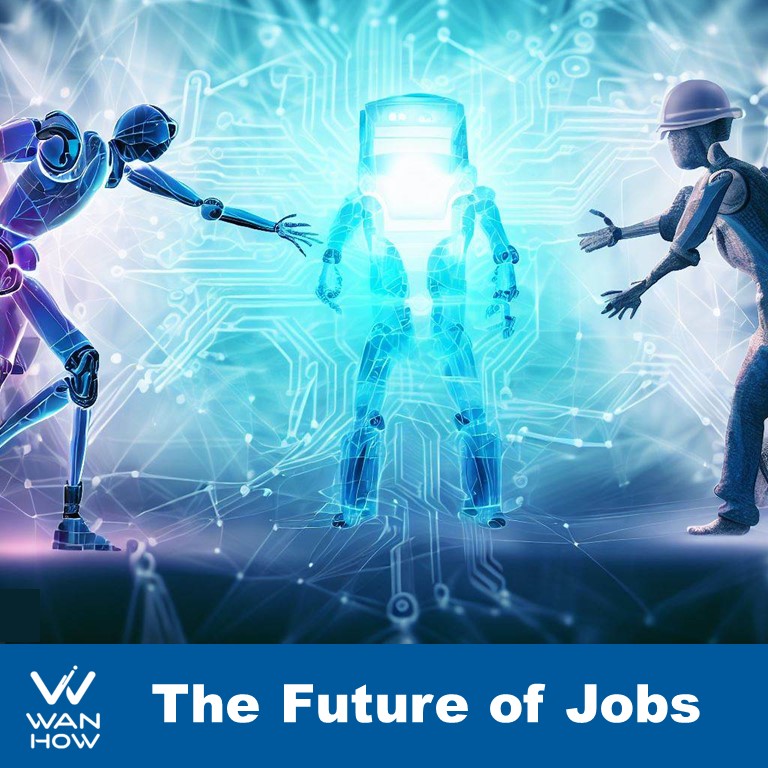
The world is changing at a rapid pace, and with it, the job market is evolving too. A recent report by the World Economic Forum predicts that by 2025, over half of all employees will require significant reskilling and upskilling to keep up with the demands of the future workplace. This means that it’s more important than ever before to prepare for the future of jobs by developing essential skills that will help you stay ahead of the curve. In this article, we’ll explore some of the most important skills you need to focus on, including adaptability, creativity, and emotional intelligence. We’ll also discuss how you can start developing these skills now, so that you can be ready for whatever the future of work holds. Whether you’re just starting out in your career or are a seasoned professional, this guide will provide you with valuable insights and practical tips for staying ahead of the game.
The Changing Job Market
The job market is changing rapidly, and it’s not just because of technological advancements. Globalization, demographic shifts, and geopolitical changes are also contributing to a constantly evolving work landscape. Automation and artificial intelligence are replacing jobs that previously required human intervention. This means that workers need to be prepared with the skills that cannot be automated and will always be in demand.
The jobs that will thrive in the future will require a combination of technical, social, and emotional skills that are uniquely human. The World Economic Forum’s report predicts that skills such as complex problem solving, critical thinking, creativity, emotional intelligence, and cognitive flexibility will be in high demand in the coming years. The report also highlights the need for workers to be adaptable and willing to learn new skills as the job market evolves.
Why Developing Essential Skills is Important
In a rapidly changing job market, it’s essential to develop skills that will help you stay competitive. The jobs that will thrive in the future are those that require a combination of technical, social, and emotional skills. Developing these skills will not only help you stay relevant in the job market, but it will also make you a more well-rounded and valuable employee.
Employers are increasingly looking for candidates who have a broad range of skills and can adapt to different situations. By developing essential skills, you’ll be able to demonstrate that you have the ability to think critically, solve complex problems, and work effectively in a team. You’ll also be able to demonstrate emotional intelligence, which is becoming increasingly important in the workplace.
Essential Skills for the Future Job Market
Critical Thinking and Problem Solving
Critical thinking and problem solving are essential skills that will always be in demand. These skills involve the ability to analyze information, identify patterns, and make informed decisions. In the future, jobs will require workers who can think critically and creatively to solve complex problems.
To develop your critical thinking and problem-solving skills, start by questioning assumptions and challenging conventional wisdom. Look for alternative solutions to problems and consider the potential consequences of your decisions. Practice analyzing data and identifying patterns to develop your analytical skills.
Creativity and Innovation
Creativity and innovation are becoming increasingly important in the workplace. Employers are looking for employees who can think outside the box and come up with innovative ideas and solutions. Creative thinking involves the ability to generate ideas, think laterally, and approach problems from different angles.
To develop your creativity and innovation skills, start by challenging yourself to think differently. Look for opportunities to brainstorm ideas and explore new ways of approaching problems. Practice divergent thinking, which involves generating many different ideas, and then convergent thinking, which involves selecting the best ideas and turning them into actionable plans.
Emotional Intelligence
Emotional intelligence is the ability to understand and manage your own emotions, as well as the emotions of others. This skill is becoming increasingly important in the workplace, as it allows workers to communicate effectively, build strong relationships, and work effectively in teams.
To develop your emotional intelligence, start by becoming more self-aware. Pay attention to your own emotions and how they affect your behavior. Practice active listening, which involves listening to others without judgment and acknowledging their feelings. Develop your empathy skills by trying to understand others’ perspectives and emotions.
Adaptability and Flexibility
Adaptability and flexibility are becoming increasingly important in the workplace. The ability to adapt to change and work effectively in different environments is essential for success in the future job market. Employers are looking for workers who can learn new skills quickly and adapt to new situations.
To develop your adaptability and flexibility skills, start by embracing change. Look for opportunities to learn new skills and take on new challenges. Practice being open to new ideas and perspectives, and be willing to take on different roles and responsibilities.
Digital Literacy
Digital literacy is the ability to use digital tools and technologies effectively. In the future job market, digital literacy will be essential for success. Employers are looking for workers who can use technology to solve problems, communicate effectively, and work efficiently.
To develop your digital literacy skills, start by familiarizing yourself with different digital tools and technologies. Learn how to use software programs, social media platforms, and other digital tools that are relevant to your industry. Practice staying up-to-date with new technologies and learning how to use them effectively.
Collaboration and Teamwork
Collaboration and teamwork are essential skills for success in the future job market. Employers are looking for workers who can work effectively in teams, communicate clearly, and build strong relationships with colleagues.
To develop your collaboration and teamwork skills, start by practicing active listening and effective communication. Learn how to work effectively with different personality types and resolve conflicts in a constructive way. Look for opportunities to collaborate with others and take on team projects.
Lifelong Learning
Lifelong learning is becoming increasingly important in the workplace. The job market is evolving rapidly, and workers need to be prepared to learn new skills and adapt to new situations throughout their careers.
To develop your lifelong learning skills, start by embracing a growth mindset. Be open to new ideas and perspectives, and look for opportunities to learn new skills and take on new challenges. Stay up-to-date with industry trends and developments, and be willing to invest time and energy into your own professional development.
How to Develop Essential Skills
Developing essential skills takes time and effort, but it’s worth the investment. Here are some tips for developing the essential skills you need to succeed in the future job market:
– Set goals for yourself: Identify the skills you want to develop and set specific, measurable goals for yourself.
– Practice regularly: Developing essential skills requires practice. Look for opportunities to practice your skills in different situations.
– Seek feedback: Ask for feedback from colleagues, mentors, and supervisors to help you identify areas for improvement.
– Learn from others: Look for opportunities to learn from others who have developed the skills you want to develop.
– Take courses and attend training sessions: Take advantage of courses and training sessions that are relevant to the skills you want to develop.
– Find a mentor or a coach: Reach out to your network to find a mentor. If you can’t find one, they don’t have the time or are not available, look for a professional coach.
– Read widely: Read widely to stay up-to-date with industry trends and developments.
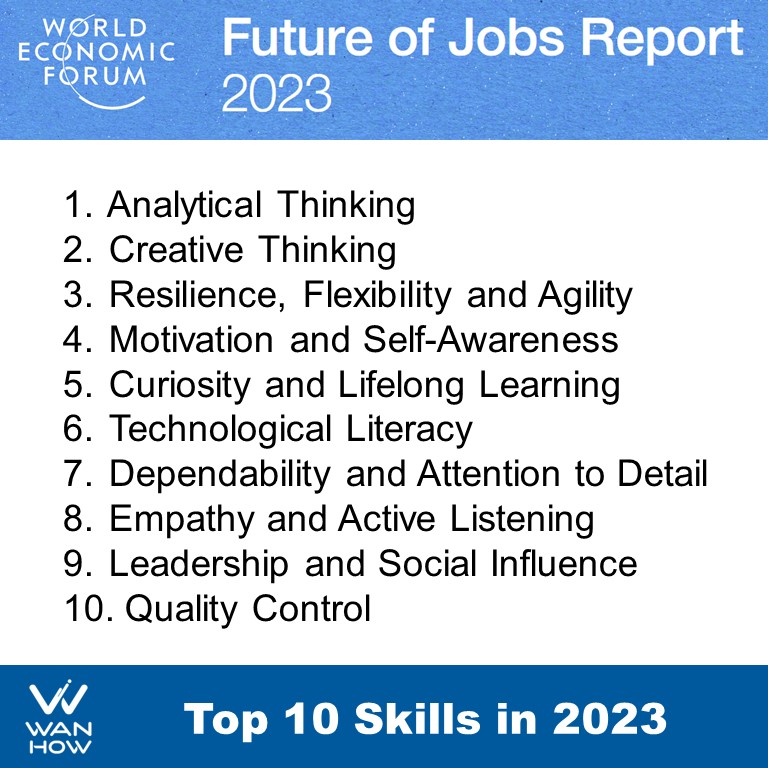
Future of Work: Top Skills Needed
The World Economic Forum publishes the Future of Jobs Report every 2.5 years. The outlook is for the next 5 years so this report released in May 2023 scans the horizon until 2027.
The top 10 core skills identified by survey respondents are:
1. Analytical Thinking
2. Creative Thinking
3. Resilience, Flexibility and Agility
4. Motivation and Self-Awareness
5. Curiosity and Lifelong Learning
6. Technological Literacy
7. Dependability and Attention to Detail
8. Empathy and Active Listening
9. Leadership and Social Influence
10. Quality Control
Cognitive skills (#1 and 2) are the top two core skills in 2023. This reflects the importance of complex problem-solving abilities. Self-efficacy skills (#3, 4, 5 and 7) trump technology skills (#6) and working with others (#8 and 9). One management skill (#10) barely made it into the top 10.
Of the top 10 skills, the fastest growing are:
1. Creative Thinking
2. Analytical Thinking
3. Technological Literacy
4. Curiosity and lifelong learning.
As the lifecycle of skills decrease, it is important to have a resilient and reflective workforce that embraces a culture of lifelong learning.
What does this mean for project professionals?
Most PMs already embrace lifelong learning and adopt technological innovations. The biggest skills boost will be in the areas of analytical and creative thinking. Use project-based data to analyze and surface project problems and opportunities. Then use the creative application of PM best practices to solve them.
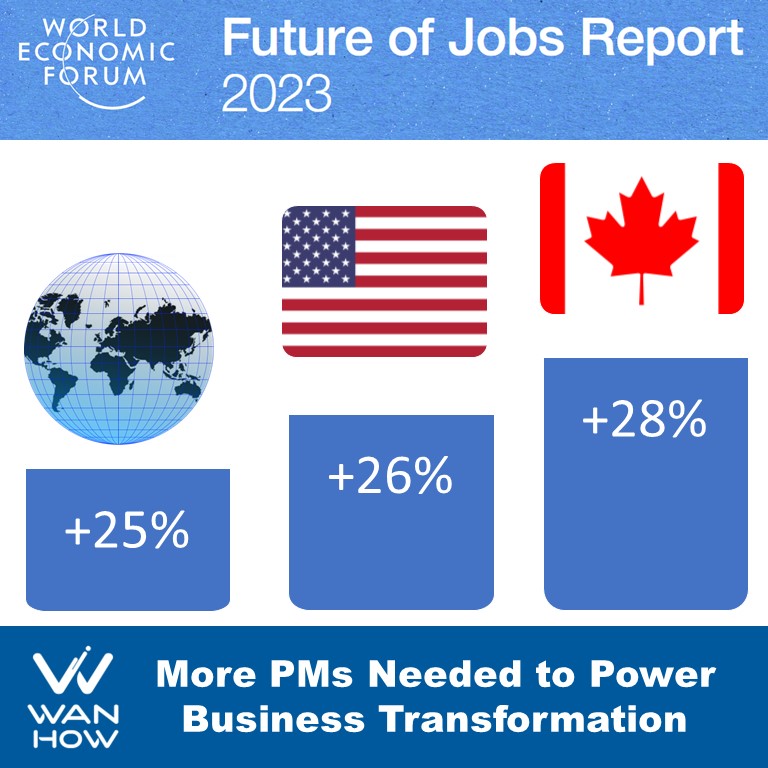
Future of Jobs: More Project Managers Needed
In 2020, the World Economic Forum projected a decline in project management jobs, advising PMs to transition into new roles such as Product Management.
The outlook has changed.
Over the next five years, the Future of Jobs report anticipates the need for 25% more project managers worldwide. That number is slightly higher in Canada (28%) where PM is the 3rd most in demand role for business transformation. Likewise in the US, the demand for PMs is 26% over the next 5 years.
What is fueling the need for more PMs? Major shifts in the underlying economic structure and the need for businesses to transform to meet these changes.
Other key roles needed for business transformation are:
1. AI and Machine Learning Specialists: +40% globally.
2. Business Intelligence Analysts: +35% globally.
3. Data Analysts and Scientists: +34% globally.
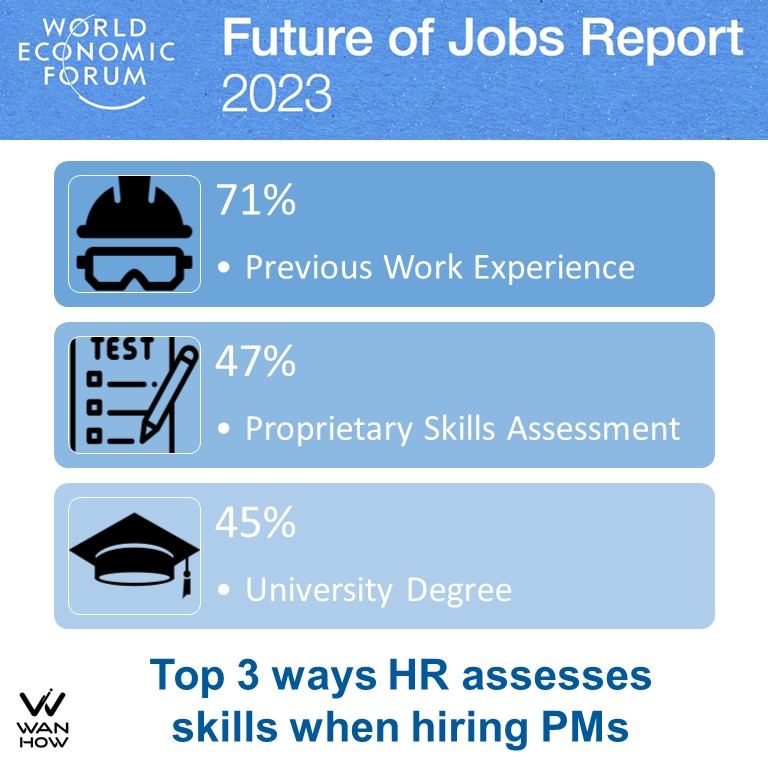
Future of Jobs: Top 3 Ways Hiring Managers Assess Your Skills
What are the top ways that hiring managers assess whether you have the right skills for a job? According to the World Economic Forum’s Future of Jobs Report released in May 2023:
1. 71% of employers rely on previous job experience. This is to be expected and the reason why you need to highlight relevant skills and experience on your resume.
2. 47% of employers use proprietary skills assessment. This is a custom test that hiring managers use. What is increasingly common for project management job candidates is to be given an assignment regarding an upcoming project – including the context and problem it’s intended to solve. They are then told to prepare a presentation for a panel who will ask them questions about the project.
3. Your undergraduate and post-graduate degrees matter to 45% of employers. Again, this is to be expected. From my perspective, the Project Management Professional (PMP) certification falls into this category for some hiring managers.
4. Psychometric profiling is used 27% of the time. Based on experience, this is used for higher level leadership and managerial positions to ensure the best hire. Why? Because a poor fit is potentially costly for the company in terms of severance pay, time to rehire, and the negative impact to direct reports.
5. What’s the value of micro-credentials? Short courses and online certificates are only considered by 20% of companies. So my advice is to use these primarily for actual learning and only secondarily to increase your employability.
I’ve met PMs with a string of certifications who struggle to get their next level jobs. They think that getting another certification will help their chances. It may, but only marginally. In fact, some hiring managers frown upon overly credentialed applicants and now we know why. They prefer experience over credentials. So, to get your next level job, work on closing that experience gap.
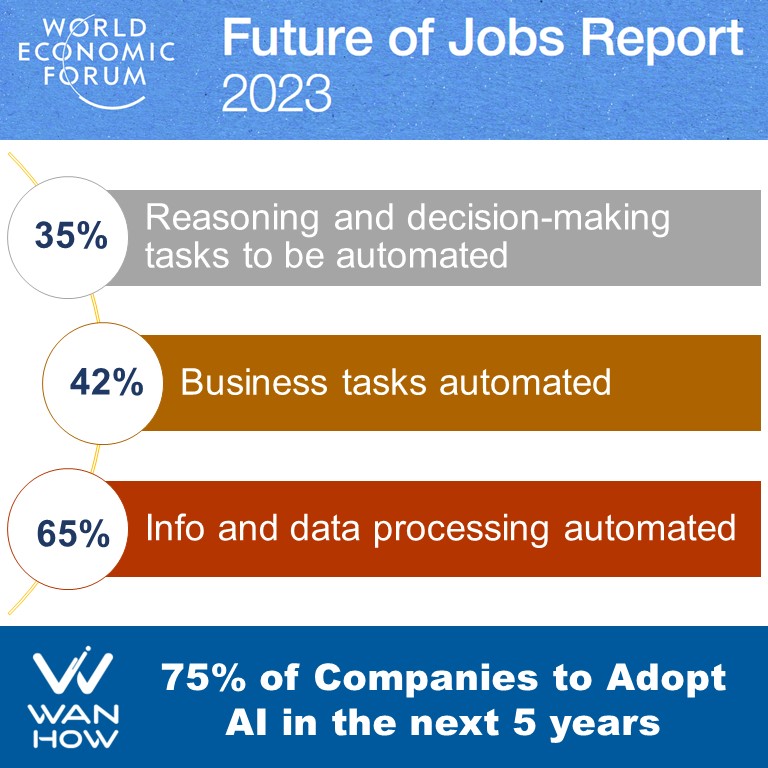
Future of Jobs: AI to Eat Your Lunch
Back in 2020, the World Economic Forum expected 47% of business tasks to be automated by 2025. Three years later, 34% of business tasks are automated. That’s a negligible 1% increase from 2020.
As a result, expectations have now been revised down to 42% of business tasks to be automated by 2027. Here are some highlights from the Future of Jobs report.
Over the next five years:
75% of companies will adopt:
* Digital platforms and apps
* Ecommerce and digital trade
* Education technologies for workforce
The top 3 technologies to be adopted are:
* Big data
* Cloud computing
* AI
AI
* 75% of companies expect to adopt AI
* 50% expect job growth
* 25% expect job loss
Top 3 Technological drivers of job growth
* Big data analytics
* Climate change tech and Environmental management tech
* Encryption and cybersecurity
Job displacement to come from
* Agritech
* Digital platforms and apps
* Ecommerce and digital trade
* AI
The deployment of humanoid and non-humanoid robots is expected to result in
* 35% of reasoning and decision making to be automated
* 65% of info and data processing to be automated
* destruction of related jobs
Conclusion
Preparing for the future of jobs is essential for success in the rapidly changing job market. Developing essential skills such as critical thinking, creativity, emotional intelligence, adaptability, digital literacy, collaboration, teamwork, and lifelong learning will help you stay competitive and relevant in the future workplace. By setting goals, practicing regularly, seeking feedback, learning from others, taking courses and attending training sessions, and reading widely, you can start developing these essential skills now and be ready for whatever the future of work holds.
Need help preparing for the future of jobs? Schedule a strategy session.
Related posts
